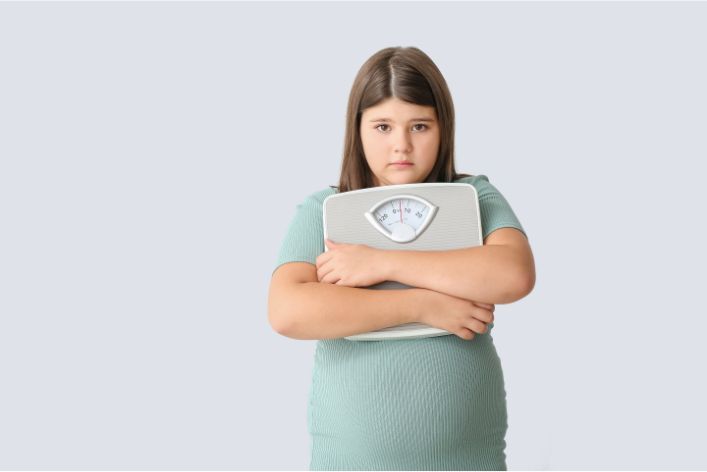Introduction
Childhood obesity is a serious issue affecting children all over the world. It is defined as the accumulation of excess body fat, leading to adverse health effects. The prevalence of childhood obesity has tripled in the last three decades. This calls for the need to address it as a global concern.
The importance of addressing childhood obesity lies in the fact that it can not only lead to physical health problems but also affects mental and social well-being. Children with obesity often face bullying and low self-esteem.
This blog post aims to provide parents with a guide to coping with childhood obesity. This guide will include tips on how to address the issue, how to talk to your child about it, and how to create a healthy environment for your child at home. It will also provide resources and support for families who are dealing with childhood obesity.
We understand the stress and difficulties that come with this issue. That is why we hope to offer our readers some hope, comfort, and practical advice through this blog post. Let us take the first step towards a healthier future for our children!
Causes of Childhood Obesity
Childhood obesity is a complex health issue that occurs due to interactions between genetic, environmental, and lifestyle factors. In this chapter, we will explore the causes of childhood obesity.
Genetic Factors
- Obesity can be hereditary, and children may be more likely to become obese if their parents are overweight or obese.
- Genetic factors can influence metabolism, appetite, and the body’s ability to store fat.
Environmental Factors
- Environmental factors can play a significant role in childhood obesity, including access to healthy food and safe places to exercise.
- Families living in high-poverty neighborhoods may have limited access to affordable, healthy food and safe outdoor recreation areas.
- Children who lack access to physical education at school or live in unsafe neighborhoods may have limited opportunities for physical activity.
- Marketing of unhealthy food and beverages can also contribute to childhood obesity, as it may influence children’s food preferences and consumption habits.
Sedentary Lifestyle
- Children who spend a lot of time sitting or engaging in sedentary activities such as watching TV, playing video games, or surfing the Internet are at a greater risk of becoming obese.
- Research has found that sedentary activities displace time for physical activity, leading to fewer calories burned and increased risk for weight gain.
Unhealthy Diet
- A diet that is high in calories, saturated and trans fats, sugar, and salt can contribute to childhood obesity.
- Children who frequently consume fast food, processed snacks, and sugary drinks are at higher risk for obesity.
- Parents who are busy or lack knowledge about healthy nutrition may find it challenging to provide healthy meals and snacks for their children.
Combating childhood obesity requires a comprehensive approach that addresses the underlying causes from multiple angles. Parents can provide healthy foods, encourage physical activity, and limit sedentary time to reduce the risk of childhood obesity.
Engaging in healthy behaviors as a family can also promote positive habits and improve overall health outcomes for children.
Read: Solutions for Common Child Health Issues in Nigeria
Consequences of Childhood Obesity
Childhood obesity is more than just a physical problem. The consequences of this condition go far beyond just having extra weight. Here are some of the most significant consequences of childhood obesity:
Social and Psychological Implications
- Children who are obese often feel socially isolated and stigmatized.
- They may also experience bullying and discrimination from their peers.
- This can lead to low self-esteem, depression, and anxiety.
- Children who are obese may also have fewer opportunities to participate in physical activity or social events.
Health Risks and Complications
- Obese children are at a higher risk for developing a range of health problems, including Type 2 diabetes, high blood pressure, and high cholesterol.
- These health conditions can have lifelong consequences.
- Obese children may also experience sleep apnea, joint problems, and asthma.
- They are also more likely to develop liver disease, gallstones, and certain types of cancer.
- Childhood obesity is associated with a shorter lifespan and an increased risk for premature death.
Economic Burden
- The economic burden of childhood obesity is significant.
- Obese children require more frequent visits to the doctor and hospitalization.
- These costs add up quickly and can take a toll on families and the healthcare system.
- Obese children are also more likely to miss school, which can lead to lower academic achievement.
- Over time, individuals who are obese may have a harder time finding a job and earning a higher income.
The consequences of childhood obesity are significant and long-lasting. Children who are obese face a higher risk of developing chronic health problems and experiencing social and psychological challenges.
The economic burden of childhood obesity affects families, healthcare systems, and society as a whole. It is crucial for parents to take steps to prevent childhood obesity and promote a healthy lifestyle for their children.
Read: Safeguarding Child Health with Clean Water & Sanitation

Preventing Childhood Obesity
Childhood obesity is a growing problem that affects millions of children worldwide. Obesity can lead to a variety of health problems, including diabetes, heart disease, and high blood pressure.
Education and Awareness
- Parents should educate themselves about the risks and consequences of childhood obesity.
- They should also learn about the importance of a healthy lifestyle and balanced diet.
- Community organizations can also provide educational programs and resources to promote healthy habits.
Healthy Lifestyle Choices
- Parents should encourage their children to make healthy lifestyle choices by setting a positive example.
- This includes eating a balanced diet, getting enough sleep, and avoiding unhealthy habits like smoking.
Physical Activity
- Children should engage in physical activities regularly, such as sports, dance, or other active hobbies.
- Parents should encourage their children to be physically active and limit their time spent sitting in front of screens.
Balanced Diet
- Children should eat a balanced diet that includes fruits, vegetables, whole grains, lean proteins, and healthy fats.
- Parents should limit their children’s intake of sugary drinks, processed foods, and fast food.
- They should also encourage their children to drink plenty of water and eat healthy snacks like fruits and vegetables.
Promoting Healthy Habits at Home
- Parents should create a healthy home environment by providing nutritious meals and snacks.
- They should also limit access to unhealthy foods and drinks and encourage their children to make healthy choices.
- Family meals should be a priority to promote healthy eating habits and family bonding.
Preventing childhood obesity requires a comprehensive approach that involves education, healthy lifestyle choices, physical activity, a balanced diet, and promoting healthy habits at home. By setting a positive example and providing a healthy environment, parents can help their children develop healthy habits that will last a lifetime.
Read: How to Manage Picky Eating Among Nigerian Children
Parenting Made Just for You
Get personalized Parenting Solutions tailored to your child’s needs. Transform your parenting journey with expert guidance in 1-3 days.
Get StartedCoping with Childhood Obesity
Identifying Signs of Obesity
Childhood obesity is a growing problem in our society, but it can be reversed with proper identification and intervention. Signs of obesity include a high body mass index (BMI) for their age, an increased waist size, and difficulty breathing or sleeping.
Seeking Professional Help
It is important for parents to seek professional help when dealing with childhood obesity. Pediatricians, nutritionists, and psychologists can offer guidance and support in making lifestyle changes, creating healthy meal plans, and addressing emotional issues related to obesity.
Supporting Children Emotionally
Children with obesity may face teasing, bullying, and low self-esteem. Parents can offer emotional support by listening to their concerns, providing a safe and accepting environment, and promoting positive body image regardless of their size.
Creating a Positive Environment for Change
Creating a positive environment for change can involve changes in the home such as removing unhealthy foods from the pantry, encouraging physical activity, and involving the whole family in meal planning and preparation. This sets the stage for a healthy lifestyle.
Setting Achievable Goals
Setting achievable goals helps children build confidence and self-esteem. These goals can be small, such as walking for 10 minutes a day, or larger, such as losing 10% of their body weight over the course of a year. Celebrate progress and emphasize the importance of consistency and perseverance.
In essence, coping with childhood obesity requires a whole-family approach. A combination of professional help, emotional support, environmental changes, and goal setting can provide the tools and resources necessary for children to achieve and maintain a healthy weight.
Read: Balanced Diet for Kids: Nigerian Meals Edition
Conclusion
As parents, it is our responsibility to take action against childhood obesity. We must take an active role in preventing and coping with this issue. By making simple lifestyle changes at home, we can set our children on a path towards a healthy and active life.
It is important to remember the long-term consequences of childhood obesity, such as an increased risk for chronic diseases and a negative impact on self-esteem. Taking steps to prevent childhood obesity now can have a significant impact on their future health and well-being.
So, let’s make a commitment to our children’s health. We can start by providing them with healthy food choices, encouraging physical activity, and limiting screen time. We can also advocate for better nutrition and physical education programs in schools.
Together, we can make a positive difference in the lives of our children. Let’s take action now to prevent and cope with childhood obesity.




